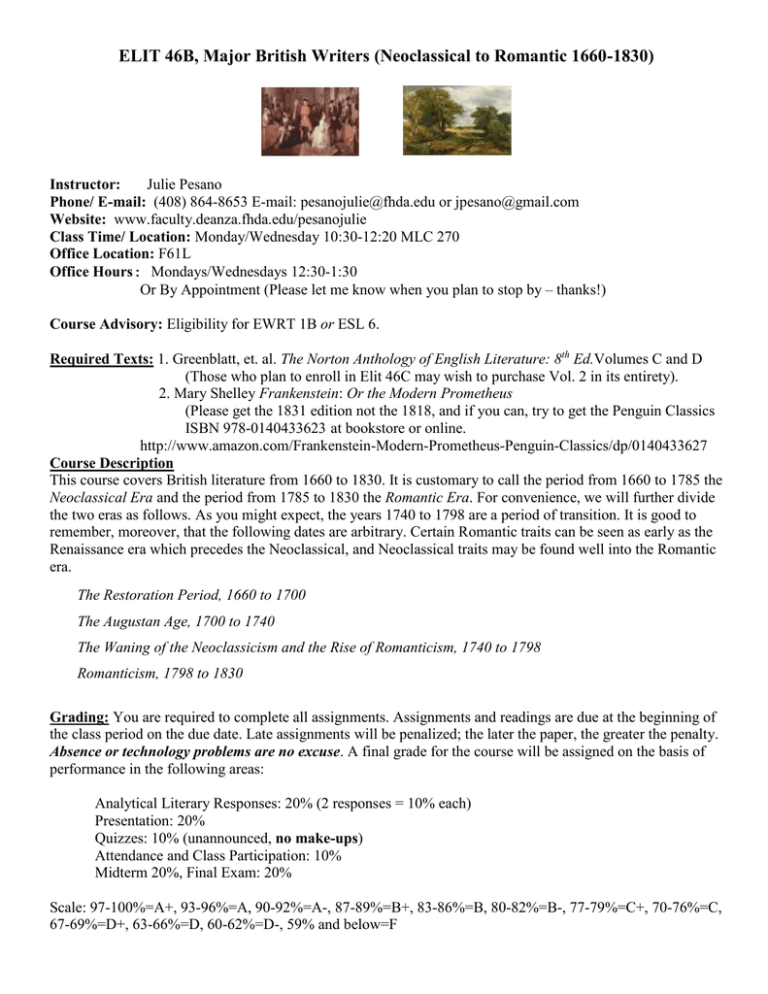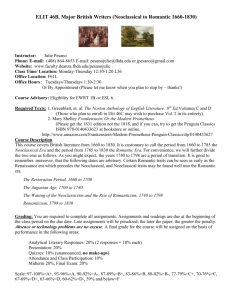Elit 46B Syllabus 2016
advertisement

ELIT 46B, Major British Writers (Neoclassical to Romantic 1660-1830)
Instructor:
Julie Pesano
Phone/ E-mail: (408) 864-8653 E-mail: pesanojulie@fhda.edu or jpesano@gmail.com
Website: www.faculty.deanza.fhda.edu/pesanojulie
Class Time/ Location: Monday/Wednesday 10:30-12:20 MLC 270
Office Location: F61L
Office Hours: Mondays/Wednesdays 12:30-1:30
Or By Appointment (Please let me know when you plan to stop by – thanks!)
Course Advisory: Eligibility for EWRT 1B or ESL 6.
Required Texts: 1. Greenblatt, et. al. The Norton Anthology of English Literature: 8th Ed.Volumes C and D
(Those who plan to enroll in Elit 46C may wish to purchase Vol. 2 in its entirety).
2. Mary Shelley Frankenstein: Or the Modern Prometheus
(Please get the 1831 edition not the 1818, and if you can, try to get the Penguin Classics
ISBN 978-0140433623 at bookstore or online.
http://www.amazon.com/Frankenstein-Modern-Prometheus-Penguin-Classics/dp/0140433627
Course Description
This course covers British literature from 1660 to 1830. It is customary to call the period from 1660 to 1785 the
Neoclassical Era and the period from 1785 to 1830 the Romantic Era. For convenience, we will further divide
the two eras as follows. As you might expect, the years 1740 to 1798 are a period of transition. It is good to
remember, moreover, that the following dates are arbitrary. Certain Romantic traits can be seen as early as the
Renaissance era which precedes the Neoclassical, and Neoclassical traits may be found well into the Romantic
era.
The Restoration Period, 1660 to 1700
The Augustan Age, 1700 to 1740
The Waning of the Neoclassicism and the Rise of Romanticism, 1740 to 1798
Romanticism, 1798 to 1830
Grading: You are required to complete all assignments. Assignments and readings are due at the beginning of
the class period on the due date. Late assignments will be penalized; the later the paper, the greater the penalty.
Absence or technology problems are no excuse. A final grade for the course will be assigned on the basis of
performance in the following areas:
Analytical Literary Responses: 20% (2 responses = 10% each)
Presentation: 20%
Quizzes: 10% (unannounced, no make-ups)
Attendance and Class Participation: 10%
Midterm 20%, Final Exam: 20%
Scale: 97-100%=A+, 93-96%=A, 90-92%=A-, 87-89%=B+, 83-86%=B, 80-82%=B-, 77-79%=C+, 70-76%=C,
67-69%=D+, 63-66%=D, 60-62%=D-, 59% and below=F
Honors Option This course can be taken for honors credit. In order to register as an honors student, you must
be in the honors program or take this course as your first honors cohort as a trial. To obtain an Honor's grade,
you are required to complete the honors project (see handout). In addition, the program expects that you
perform above and beyond average level - that means added insights in class discussion, excellent attendance,
and exceptional quality on quizzes and midterms. Honors is not just more quantity but better quality. Finally,
honors students will be required to present the first biographical/historical presentations. To add the section, get
an honors code from me, drop yourself from the regular section and add yourself to the honors section
ELIT46BH1.
*** Extra credit: (Optional) – Get creative! Write a poem, essay, brief short story in the style of one of our
authors. For example, write a satirical poem in the style of the Rochester slamming someone or something you
want to mock (celebrity, your parents, the De Anza registration process!) Maximum 1-2 pages, typed, double
space, on 8.5x11 white paper. This is worth 1% of your total grade (or the equivalent to 5 points in your quiz
section). You may do a maximum of 1 and turn it in any time before the end of the quarter.
Attendance: Students must attend the first week of class to secure their enrollment. If you do not come on
any day of the first week, I will drop you and give your seat to a waitlisted student. Regular class attendance is
necessary for successful completion of this course. Each student will be allowed 2 absences with no penalty.
For each absence thereafter, the attendance grade will be reduced by one letter grade. An excess of 4 absences
will result in a withdrawal from the course. 3 lates will result in 1 absence. Students who are absent are
responsible for all announcements made, assignments given, and material covered.
Participation:
ELIT 46B is a discussion-based course. Your class “presence” will be public and you will be asked to express
your ideas about the texts regularly. Students are expected to do the assigned readings before each session and
to come prepared to discuss the readings in both small groups and class discussions. If you attend every class
but participate minimally, you will not receive a high grade for attendance and participation (10% of grade).
You must be prepared, engaged, and involved in the classroom community in order to succeed.
The Classroom: Please, come to class on time! Turn all electronic devices (cell phones, Ipads, etc.) off or to
vibrate before class starts and please avoid texting, video games, or any other distractions not related to course
content. During the quarter, you will frequently encounter values and beliefs, which differ from your own.
Show respect for the ideas of others and others will do the same for yours.
Honesty: (Plagiarism) I am interested in your ideas as well as how clearly you can discuss the ideas of others.
If you use the ideas of anyone else (printed, friends, on-line), acknowledge your source immediately in parentheses
(MLA style). If you use the words of a source, use quotation marks and acknowledge the source. Plagiarism
automatically results in a zero for the assignment with no opportunity for makeup. If you are uncertain about
the rules for using a source, come see me before you turn in the assignment.
About Course Content:
This is an adult level course; therefore, the subject matter of readings and discussions will contain adult
material and will not be censored.
The Reading Load:
This class is a literature class, so the reading load is high! Do the best you can, and if you fall behind, it is your
job to catch up, not the course’s job to slow down. Also, the texts we read can and will be challenging, so
please make sure to take good notes and come up with questions as you read so that you can be prepared to
participate in class.
Need Money?
De Anza’s Financial Aid Office, on the bottom floor of the Hinson Center (near Campus Police) gives out
many scholarships!The website is http:www.deanza.fhda.edu/financialaid/scholist.htm or contact Cindy
Castillo (408)864-8403 or castillocindy@fhda.edu.
Need Special Accommodations?
If you have any special circumstances that you feel may influence your performance in this class (a diagnosed
learning disability, physical disability, or anything at all that might interfere with your learning), please come
chat with me so that we can create a learning environment that works for you.
Important Dates: (see http://www.deanza.edu/calendar/)
Last day to add Winter Quarter classes (Add date is enforced)
Saturday, April 16
Last day to drop a class with no record of grade and full refund (Drop date is enforced)
Last day to drop with a "W" (Withdraw date is enforced) Friday, May 27
Memorial Day Holiday (no class) Monday, May 30
Sunday, April 17
ELIT 46B Tentative Schedule Spring 2016
All readings below come from The Norton Anthology or Frankenstein
Complete Readings before the week meeting and be reading for unannounced quizzes.
Week 1
The Restoration
4/4-4/6 Introduction to the course
Reading Assignment: “The Restoration and the Eighteenth Century 1660-1785” 2057-2082
John Wilmot, Second Earl of Rochester 2167
“Satyr on Charles II” http://andromeda.rutgers.edu/~jlynch/Texts/charles2.html
Sample Quiz on Reading
Assign Presentations
Week 2
Satire
4/11-4/13
{Presentation #1 – 4/11}
Reading Assignment: John Dryden 2083-2084 “MacFlecknoe” 2111-2117
“Wit as ‘Propriety’” 2131, “The Art of Satire” 2131-2132
Week 3
Political Allegory
4/18-4/20
{Presentation #2 4/18}
Reading Assignment: Jonathan Swift 2301-2303 “A Modest Proposal” 2462-2468, Gulliver’s Travels
Part 1 (2323-2365)
Analytical Response #1 due 4/20
Week 4
4/25-4/27
Week 5
5/2-5/4
Week 6
Height of Neoclassicism
{Presentation #3 – 4/25}
Reading Assignment: Alexander Pope 2493-2496, “The Rape of the Lock” 2514-2532
Rise of the Novel
{Presentation #4 – 5/2}
Reading Assignment: Aphra Behn 2178-2180 Oroonoko, or The Royal Slave 2183-2226
5/9-5/11
Review for Midterm 5/9
Midterm Exam 5/11
Week 7
Early Romanticism
5/16-5/18
{Presentation #5- 5/16}
Reading Assignment: Switch to Volume D of the Norton Anthology
“The Romantic Period 1785-1830” 1-22
William Blake 76-79 Songs of Innocence and Experience 81-97
Week 8
5/23-5/25
Romantic Movement Continued (The Lake Poets)
{Presentation #6 – 5/23}
Reading Assignment: William Wordsworth 243-245, Lyrical Ballads 245-274
Samuel Taylor Coleridge 424-426 “The Rime of the Ancient Mariner” 430-446
Week 9
5/30-6/1
Later Romanticism
Memorial Day Holiday – No Class 5/30
{Presentation #7 – 6/1}
Reading Assignment: George Gordon, Lord Byron 607-611, “She walks in beauty” 612, “When
we two parted” 613, Don Juan Canto 1 669-697
Percy Bysshe Shelley 741-744 “Mont Blanc” 762-766
Analytical Response #2 due 6/1
Week 10
The Gothic Novel
6/6-6/8 {Presentation #8 – 6/6}
Reading Assignment: “The Gothic and the Development of Mass Readership” 577-579
Frankenstein by Mary Shelley
Letters - Volume 2 Chapter 2 (Chapt 10) (p. 13-98 in Penguin Edition)
Week 11
6/13-6/15
Week 12
6/22
Reading Assignment: Frankenstein by Mary Shelley
Volume 2 Chapter 3 (chapt. 11) – end (pages 99-215 in Penguin Edition)
Final Exam Wednesday 6/22 9:15-11:15



